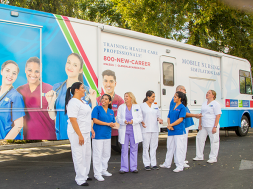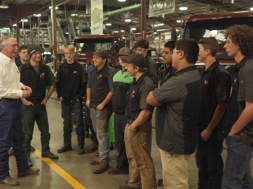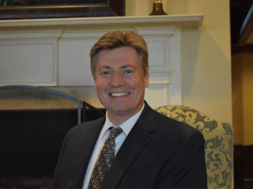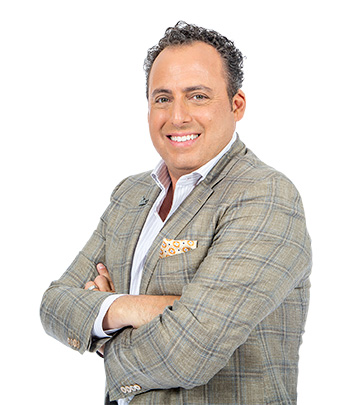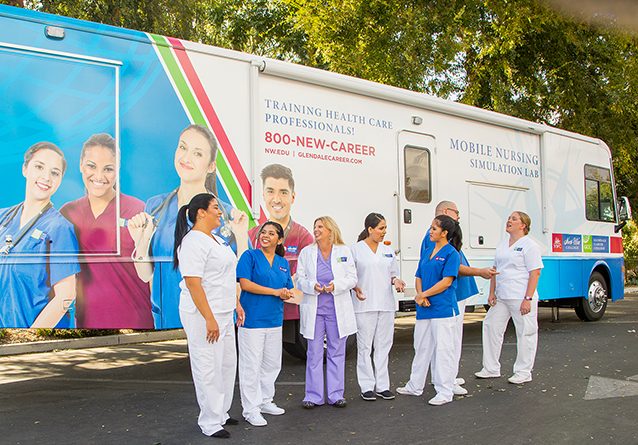
Keeping the Legacy Alive: How a Grandmother’s Dream and a Mother’s Mission Became a Son’s Fulfilling Career
Interview with Mitchell Fuerst, President, Success Education Colleges
Leadership. Webster’s New World Dictionary defines it as the ability to lead, command, direct or guide. Peter Drucker, management consultant and author, once said: “Management is doing things right; leadership is doing the right things.”
What are the right things and how do you lead effectively? That’s what “Career Education Review” hopes to uncover, and much more, in its series on leaders within the career education sector.
Q: Tell us a little bit about your background in career education.
A: I’ve been at Success Education Colleges for 26 years professionally, but I grew up around the college because my mother, Marsha Fuerst, founded the college. I succeeded my mom as the organization’s president in 2010.
Q: Your mother founded North-West College in 1966; can you tell us the history of the school?
A: It was actually my grandmother who had this dream to open up a career college to train health professionals. They were about to pour the slab for the foundation of the first building in West Covina in 1965 when my grandmother took ill and went into the hospital. My mom went to her bedside, and my grandmother told her to open the college. My mom’s reply was that she didn’t know how to run a college or how to run a business and that she didn’t even have the business attire to wear.
My grandmother told my mom to go into her closet and wear her clothes, go to the bank and get a loan, and to please fulfill her dream to open a college.
My mom always famously told the story of how she was almost a little naïve, opening the doors to the college in 1966 because of marching orders from her mom. She enrolled the very first students herself, while in the construction trailer that was on-site. We still have those enrollment agreements from the very first students, when Medical Assisting was $560.00, and my mom had hand-penned all the enrollment agreements herself in that construction trailer.
Q: What was your grandmother’s motivation for wanting to open the school?
A: My grandmother was an instructor for an allied health program but in a public institution. She thought that this would be a neat way for people to have careers in the medical field. She came out to West Covina when it was nothing but orange fields along Interstate 10. She decided that was where she was going to open this college. Unfortunately, she never did see it open; she never came out of that hospital. My mom fulfilled her dream after my grandmother had passed away.
Q: How did your mother’s dreams change after she opened the college?
A: My mom’s original dream was to become a medical missionary. My mom came from very humble beginnings, having been born and raised in the projects of Chicago. When she was a teenager, she started to realize the negative aspects of living in the projects. She wanted to change her life, but because of her experiences, she wanted to change the lives of other people, too. She wanted to have them rise up and to not just have a job, but instead have a career. The college became her mission at that point. I tell people that she’s the hardest working human being I’ve ever known. She worked seven days a week and didn’t even take a salary from the college for three years. She worked tirelessly, which didn’t stop for her entire 43-year career at the college.
Q: Your mom did an amazing job with no previous knowledge; how would you describe her drive?
A: My mom Marsha was a pioneer for career education in California, as well as a pioneer for women in business. She used to share stories where she’d go to meetings and would get heckled by men, asking her why she was there and telling her she should be home raising her family. She sat down at the meetings, and she said if they could be there, so could she.
She was a trailblazer as a woman in business, and a pioneer in career education as we know it today.
She founded the college before accreditation even existed before the U.S. Department of Education had financial aid. To our knowledge, she was the first woman board member of the National Association of Trade and Technical Schools, which eventually became CECU. Our institution was in the California Association of Private Postsecondary Schools, and my mom was one of the people who was in the room that formed the association. That’s how long the college has been around and the impact our institution has made on career education, not only in California but nationally as well.
Q: She opened North-West College. When did it become Success Education Colleges?
A: Over the years that I had been involved in the college, we went through a series of acquisitions. As we acquired schools with different identities or brands, I knew that we had to create a parent organization. That’s why I formed Success Education Colleges as basically the holding organization for the college’s three different institutions. We own the URL success.edu, so I knew that the first two words of the parent organization had to be Success Education and then obviously colleges so then it became SEC.
Q: Describe your history with the schools and when you started working in them.
A: When I was a kid, I thought it was cool to go with my mom to the college on Saturdays. She had me convinced that opening mail was a lot of fun. She used to say look at all these different things people send you … pens and erasers and little notepads; see what the next one is. I used to sit on the floor of her office and open mail for as long as I can remember. Then I used to get in the wheelchair from the Medical Assisting lab and race down the hallways.
It was part of my childhood that I would go to the college every Saturday and deliver papers or envelopes to different team members’ desks. I was convinced that all kids did that.
I was working in a manufacturing company with my brother in my early 20s when I decided he and I had different styles, and we had a different goal in mind about how we wanted to grow that company. I knew there wasn’t enough room at the top for the two of us, which is when I thought what am I going to do with my life? Then it hit me; why don’t I go to work for mom at the college because it has done all these wonderful things for thousands of students and I wanted to continue my mom’s legacy. I was so young, and at the time I was still living with my parents. I went down the hallway and said, “Mom, I’ve got this great idea. I want to come to work for you at the college.” She said, “That’s a terrible idea.” It took me a year before I was finally able to convince her. I talked to her when she was eating. I talked to her when she was sleeping. I put notes in her car. I wrote with lipstick on her vanity mirror – hire me, hire me! A year later she finally decided to give it a shot.
Q: Why do you think your mother said no at first?
A: I often asked my mom why it took so long to convince her to bring me in and she said that she always thought we would fight. I said to her, “I think you’re right but most importantly I’m sure we can do this together, and I want to be your successor and continue your legacy of serving others.” So that’s what happened. We did fight. We had many, many tumultuous times. But truly the great times far exceeded the bad.
Q: What was your first position?
A: I started out working the West Covina campus. My first position was working in the Student Loan Assistance department, which is basically default management. Since then I’ve worked in every department in every aspect of the college.
Q: What are the names of your campuses?
A: Under the Success Education Colleges we have three different brands. We have Northwest College, Glendale Career College and Nevada Career Institute. When I entered the college 26 years ago, we had four small schools and about 67 team members. Now all these years later we have nine campuses in two states with about 550 team members.
Q: What programs do you have at your schools?
A: We’re almost exclusively focused on health care programs. We have large Nursing programs and then a whole line of Medical Assisting, Dental Assisting, Pharmacy Tech, Medical Insurance Billing, Vocational Nursing, Registered Nursing and others.
Q: What do you think makes SEC schools stand out from other schools?
A: I think we stand out from other schools because our institutional philosophy is to not have giant big-box schools. We believe that relatively smaller student populations at each campus are better than having 1,000 students at a school. We’re in the people business, and we have to be all hands on deck with our students on a daily basis. We feel that students choose one of our schools for several reasons. The first is because we have these smaller environments. Second, I truly believe that they like the fact that my mom founded the college and now I’ve succeeded her, and I’m carrying out her legacy. Third, I think they like the history, the longevity, our reputation in the communities. They also appreciate the fact that we try to do everything we can to keep tuition costs very reasonable. My mom always said that if we just charge the students a fair tuition, and we give them great skills, and we place them in the world of work, everything else will fall into place. Quite frankly, she was right about that too.
Our most important core value is that we will always take care of the student. My mom, in every meeting, in every interaction with team members, she used to say whatever is best for the student. Our core value is we will always take care of the student, and that’s our most important core value. We believe that if we take care of the student, everything else will be OK.
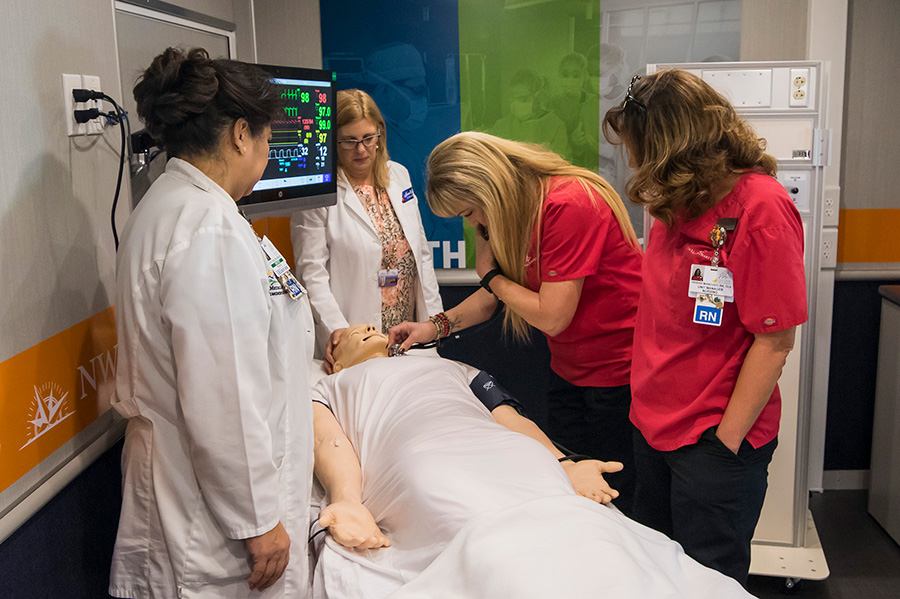
Q: What is one change or innovative idea you have implemented?
A: One of the recent innovative things that we’ve done is we’ve built a mobile, high-fidelity nursing simulation lab. It’s a bus with high-fidelity mannequins that are meant fornursing education. We built a custom bus that becomes a mobile simulation laboratory that we not only use for our students in between campuses, but we also use for our clinical partners. We invested a little over a million dollars in that mobile lab, and it’s gotten rave reviews from students, campuses and clinical partners alike. We can offer simulation training or education to our nursing students at any of our campuses. We also use it for different community events. Our clinical partners are also utilizing it. It’s just been a smash hit. It’s a unique initiative. We believe it’s the only one like it in the country.
Q: How would you describe your management style? Why do you think it works?
A: I truly believe that people like to have fun at work. I know I do. I like to lead with laughter. That’s something that makes me stand out as a leader. If we’re not having fun, we’d all go crazy. We all realize that we spend as much time at work as we do at home awake. So I want to have fun.
I truly believe that we’re all the same. We’re all putting our pants on one leg at a time. I don’t believe that I’m smarter or better than anyone else that works at SEC and I also believe that nobody works for me. I think that I work with everybody. Being humble is a trait that comes from my mom, and it’s key to my leadership style, including the most important single word that I believe in with every bone in my body, and that is transparency. I tell everyone at SEC that I’ll be 100 percent transparent with you about any subject. The only thing I ask is that you’re transparent with me in return. I think that people dig that. I think they know that I don’t have any hidden agenda, and I don’t feel I’m better than anyone. It’s let’s serve our students, and change the lives of our students for the better, and let’s have some fun doing it.
Transparency is huge for me. I always tell everyone that I will tell them anything they want to know about me, about the organization, about what our plans are.
I think too often leaders of institutions, or any organization, aren’t transparent with their teams. People like to know what’s going on and they like to feel a part of it. If you could pick the single biggest word that defines me as a leader, it would be that word of transparency.
Q: How do you keep your staff motivated?
A: I think I do a few things in particular. One is I have something called the Monday Morning Memo, and I write to the whole SEC team every other week. It’s a two-page blast out that I’ve been doing since 2010 that I send to everybody that shares different initiatives that are going on throughout the SEC system. The second way I motivate the team is I do a round of Town Halls every summer. I have question cards, everyone is sharing, and they can ask me a question. Anything that they want to know, I’ll answer. I get tons of questions on every subject about me personally or about SEC. I have different themes every year. For example, one year we did SEC’s Got Talent, which was kind of like “America’s Got Talent.” I invited team members to showcase their talent. We had people sing. People brought in their artwork. People played instruments. It is a lot of fun. The third way I try to motivate the team is that every year we have our professional development conference, our own PDC. This year it’s coming up on May 18 at the Ontario Convention Center. It’s a day of laughing and learning. We have awesome speakers that fly in from all over the country to take part in the SEC PDC. If you check it out, you’ll dig it at secpdc.com. This year we should have 400 of our team members attend. We close the whole organization down for the whole day.
Q: Do you ever get staff questions regarding the negative press or regulations regarding for-profit schools?
A: Sometimes. Obviously more recently those questions have waned. But when a team member asks me about that during Town Hall or otherwise I always answer them in a very transparent way to say that the sector came through a hurricane. In a great way, SEC has not only survived, but we have thrived during that hurricane. Now that the hurricane has kind of passed us over, it’s time to look to the horizon to see what other large systemic initiatives we can tackle. We take those questions straight on, and we always talk about why SEC is different and how we’ve been able to thrive through that hurricane.
About North-West College
Founded in 1966, North-West College has been committed to training individuals to enter and advance in the health care field for 50 years. A leader in allied health education, the College offers 12 short-term programs at seven campuses throughout Southern California, including West Covina, Pomona Valley, Van Nuys, Glendale, Riverside, Santa Ana, and Long Beach. Accredited by the Accrediting Commission of Career Schools and Colleges (ACCSC) and approved by the Bureau for Private Postsecondary Education (BPPE), North-West College offers a supportive educational environment for those ready to start a health care career. To date, the College has graduated more than 45,000 students – individuals who have gone on to raise the standard of excellence at health care organizations of all types.
For more information about North-West College and its programs, visit www.nw.edu.
Q: What are your current challenges as president, and how do you plan to overcome them?
A: I think the current challenges are that we have an improving economy so, we have some headwinds as far as admissions are concerned and generating inquiries. I think that’s one of our bigger challenges. One of my other challenges is now that the hurricane has passed, we believe it’s time to grow again. We need to decide where we’re going to put our 10th or 11th or 12th campus, or what school or college we will next acquire.
Q: What do you think are the largest challenges facing career education?
A: The largest challenge has not changed over the years, and that’s being able to effectively tell our stories to legislators at the state and national level of all of the fantastic work that our schools continue to do to help students change their lives. It’s the biggest challenge and is something that we always are dealing with and working on. We’re continuously beating that drum and getting that message out.
MITCHELL FUERST, a second-generation college administrator, is currently the President of Success Education Colleges (SEC), which is the parent organization he created to hold the Colleges’ three brands (North-West College, Glendale Career College and Nevada Career Institute); a system of allied health schools based in the Los Angeles and Las Vegas areas. Currently, SEC has nine campuses in two states. His Mother, Marsha Fuerst, founded the Colleges in 1966.
Mr. Fuerst received his Bachelor of Science in Business Administration from California Polytechnic University, Pomona and has a varied background in business, holding the Vice President of Operations position at Dynamic Displays, Inc., as well as being a founding partner in M2 Investments, LLC and Fuerst Asset Management, LLC. He joined the College as Vice-President in 1994 and over the past 24 years has been instrumental in the growth and development of the Colleges’ educational programs, as well as Student and Team Member populations. He became the Colleges’ President in the fall of 2010.
In addition to his responsibilities as President, Mr. Fuerst has served as an Advisory Committee Member for the Bureau for Private Postsecondary Education (BPPE). He is a former board member of the California Association of Private, Postsecondary Schools (CAPPS) and has served as Association President, Vice President, and Treasurer. He has served the community in many capacities, including acting as co-chairman for the Independent Coalition of Private Educators Political Action Committee (ICEPAC), and as a board member for the Distinguished Alumni Council at California Polytechnic University, in addition to his role in the Fuerst Family Foundation. Mr. Fuerst has also taken his expertise into the classroom, serving as adjunct faculty for Chaffey Community College.
He has lectured extensively on various subjects for the California Association of Private, Postsecondary Schools (CAPPS), the Association of Private Sector Colleges and Universities (APSCU), California Association of Student Financial Aid Administrators (CAASFA) and EdFund.
Contact Information: Mitchell Fuerst // President // Success Education Colleges (SEC) // MitchellF@success.edu // https://www.success.edu
